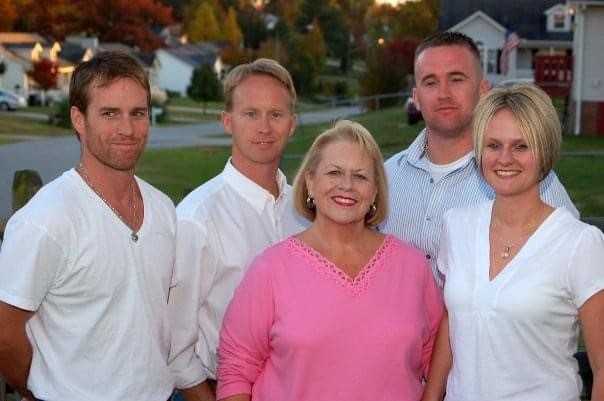Retired nurse can’t forget compassionate GTCC instructor who was the driving force in her graduation
Published on: March 26, 2024

When Cheryl Moore was 35, her world turned upside down. Suddenly, she found herself a single mother of four children without a job or many workplace skills.
“I started having children at 20, had the last one when I was barely 30. By the time I was 35, my marriage just crumbled,” explained Moore, 74, who is now retired and living in Thomasville. “I was sick for a while, but at that point, I had to go to work.”
She found a job doing basic accounting for a Triad business, but that’s when the reality of the situation hit her.
“My life changed so drastically all of a sudden, and after I went to work, I quickly realized I had to have something to help raise these children.”
Enter Guilford Technical Community College and an amazing, compassionate instructor.
At the time, Moore had a cousin who was enrolled in nursing school in the Virginia Beach area, and she assured Moore it would be a good path for her.
“I wasn’t sure about it,” recalls Moore. “I came back (from Virginia Beach) and went to GTCC and talked to a counselor. She said I should take an anatomy class and see how I do. I took the course and made an A.”
So, Moore, who was in her early 40s at that time, took another class. While enrolled in that class, the same counselor called again and suggested she sit for the test to enter nursing school.
“My plan was to take one class a quarter until I got general studies out of the way and still work,” said Moore. “The counselor called me and wanted me to sit for the nursing class. I said, 'I can’t handle four kids and a full class load.' She told me it was affordable, didn’t take much experience, and that nobody gets in the first try.”
Well, Moore did.
“I told my counselor I couldn’t handle work and these classes. I went home and prayed about it and said, ‘I’m going to do it,'” recalled Moore. “I went in and told my boss I had to quit, told him I was going to nursing school. and he actually laughed at me.”
Moore knew it was going to be a difficult, arduous path, but folks discounting her dream only provided extra incentive for someone who hadn’t been in a class since high school.
“I went in the first day. All the students were kids way younger than me. I got to pharmacology class, and I thought I would cry. The instructor put a problem on the board, and the kids all shouted out the answer, and I didn’t understand a thing. I went to my car and cried.”
Attempts at studying were fruitless. “I studied the book, and I didn’t understand a thing,” Moore said.
So, she called her oldest son, who, by this point was an adult living on his own.
“I told him I was just lost,” Moore said of the conversation with her son. “He came over and looked at the book and said, 'You just have to figure one formula (to study) that works for you.' I did, and I breezed through pharmacology.”
The rest of nursing school was a bit of a breeze for Moore, even as she continued to work part-time jobs and shepherd her children through their lives.
As graduation loomed, Moore ran into a roadblock: her final clinical rotation. She was struggling. She feared she might not pass, which in turn meant she would not graduate.
But then, at the peak of her despair, Vivian McSwain, an instructor Moore had studied under earlier, suddenly appeared and wanted to speak with her. Moore remembers McSwain as being very buttoned up and professional. “She always addressed her students as Mr. or Mrs. or Miss,” Moore said.
“She said ‘Mrs. Moore, I need to talk to you.’”
It was a short, direct conversation. McSwain offered to take Moore under her guidance for the remainder of the clinical. Moore recognized it as her best path to graduation.
“I was shocked when she said I could come with her and show her what I could do. I said, ‘I’ll come with you.’”
Moore moved into the clinical setting with McSwain where she had three patients. She recalled that one went home soon after she got there, and one moved to dialysis, leaving her with one patient. She said she did everything she could do for them.
As her time with McSwain was winding down, Moore was called into the break room where the instructor said she was going to give her her final grade.
“I said to myself, ‘This is it.' She wrote some things on a piece of paper. She didn’t speak and shoved it across the table, and I thought, 'This can’t be right, I don’t understand.' She said, ‘You don’t understand you have an A in this clinical?’ And I said, ‘Am I going to graduate,?’ and she said, ‘Of course you are.'”
Moore said she wanted to hug her instructor, but the always-professional McSwain told her to return to the floor and finish her shift.
Moore graduated from GTCC’s nursing program in 1995 and went on to a nursing career in the Triad that lasted more than 20 years. To this day, though, she doesn’t understand why McSwain suddenly appeared in her time of need.
“I still don’t know why she showed up; she just appeared. I just truly believe it was meant for me to go to nursing school. I believe the good Lord helped me through,” said Moore, who gives credit to her deep faith for much of her success.
“My time at GTCC was everything for me. It changed my life. It gave me the opportunity to get a job I liked and a salary that I was worth.”
Back to All Articles